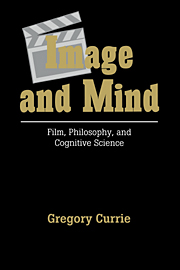Book contents
- Frontmatter
- Contents
- Preface
- Acknowledgements
- Film, 1895–1995
- Image and mind
- Introduction: the essence of cinema
- Part I Representation in film
- Part II Imagination
- Chapter 5 Imagination, the general theory
- Chapter 6 Imagination, personal and impersonal
- Chapter 7 Travels in narrative time
- Part III Interpretation
- In conclusion
- Named propositions
- Bibliography
- Index
Chapter 7 - Travels in narrative time
Published online by Cambridge University Press: 28 October 2009
- Frontmatter
- Contents
- Preface
- Acknowledgements
- Film, 1895–1995
- Image and mind
- Introduction: the essence of cinema
- Part I Representation in film
- Part II Imagination
- Chapter 5 Imagination, the general theory
- Chapter 6 Imagination, personal and impersonal
- Chapter 7 Travels in narrative time
- Part III Interpretation
- In conclusion
- Named propositions
- Bibliography
- Index
Summary
I had the impression [in Je t'aime, Je t'aime] of a sort of eternal present. The hero relives his past, but when he relives it we are with him, the film always takes place in the present. There are absolutely no flashbacks or anything like them.
Alain ResnaisIn Chapter 3 I discussed the representation of temporal properties and relations in film, deciding that film is a distinctively temporal art in that temporal properties are used to represent temporal properties. I want now to connect some issues in the filmic representation of time with the theory of imagining outlined in the previous two chapters.
TENSE IN FILM
One class of philosophically interesting and controversial temporal properties I did not discuss in Chapter 3 is that of tense properties. This consists of the properties of being past, present and future. These are properties of events, or so I shall assume for simplicity's sake. My opening the door is future at one time, present at a later time and past later still. I have argued that cinematic representations – moving images – have temporal properties, and that their temporal properties typically function to represent temporal properties of the events those images represent. Can we say tensed properties are among those which function representationally in this way?
For that to be the case, cinematic images would have to have tense properties, and, in virtue of possessing those tense properties, would have to represent fictional events as having tense properties.
- Type
- Chapter
- Information
- Image and MindFilm, Philosophy and Cognitive Science, pp. 198 - 222Publisher: Cambridge University PressPrint publication year: 1995



